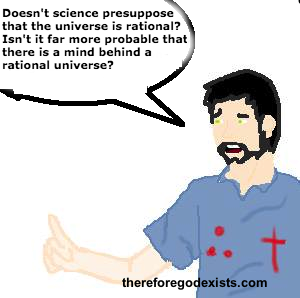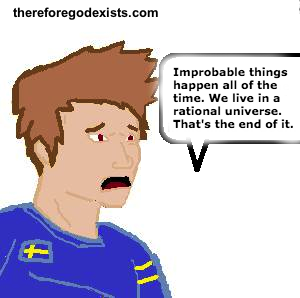 In the secular mind, there are two opposing forces in the world. Both have exhibited extreme power, and one is waning. Those powers are science and religion. Science has the power to spring mankind forward out of the clutches of ignorance, into a world of technology, convenience and intellectual wealth. On the other hand, religion stands as a baracade, holding the door to progress, shooting the horse upon which humanity rides. This narrative has unfortunately been embraced by many evangelicals who take a stance against science. While this narrative may seem compelling, it is nothing more than a tall tale. It is pure propaganda. As I try to demonstrate throughout this blog, there is no incompatibility between scientific pursuits and religious pursuits. In fact, many of the great arguments for the existence of God are indebted to science for their invaluable contribution. That is why the evangelical Christian apologist Evan Minton referred to science and the Bible as the two books that God wrote. In fact, one may further argue that science and religion are not only compatible, but that religion is both the historical and philosophical foundation for scientific pursuit. That is because if science works and the universe is rational, then God probably exists.
In the secular mind, there are two opposing forces in the world. Both have exhibited extreme power, and one is waning. Those powers are science and religion. Science has the power to spring mankind forward out of the clutches of ignorance, into a world of technology, convenience and intellectual wealth. On the other hand, religion stands as a baracade, holding the door to progress, shooting the horse upon which humanity rides. This narrative has unfortunately been embraced by many evangelicals who take a stance against science. While this narrative may seem compelling, it is nothing more than a tall tale. It is pure propaganda. As I try to demonstrate throughout this blog, there is no incompatibility between scientific pursuits and religious pursuits. In fact, many of the great arguments for the existence of God are indebted to science for their invaluable contribution. That is why the evangelical Christian apologist Evan Minton referred to science and the Bible as the two books that God wrote. In fact, one may further argue that science and religion are not only compatible, but that religion is both the historical and philosophical foundation for scientific pursuit. That is because if science works and the universe is rational, then God probably exists.
 This goes to say that secularism and science are deeply incompatible. That is why many secularists find themselves going against the grain of modern cosmology, denying the Big Bang, pointing out that there are other, better astronomical theories, because, in the words of the astronomer Dr. Robert Jastrow, “Astronomers have now painted themselves into a corner, because they have proven, by their own methods, that the world began abruptly in an act of creation…” The theological overtones of the yieldings of science could not be more explicit. That is why so many secularists are commiting themselves to absurd philosophical explanations. It is becoming abundantly clear that there is a deep incompatibility between secularism and science. But thus far I have spoken only of some scientific evidence rather than the process of science, what it presupposes and how those presuppositions conflict with atheism. If you require a syllogism, then it can be simply stated. 1 – If science works and the universe is rational, then God probably exists. Science works and the universe is rational. Therefore, God probably exists.
This goes to say that secularism and science are deeply incompatible. That is why many secularists find themselves going against the grain of modern cosmology, denying the Big Bang, pointing out that there are other, better astronomical theories, because, in the words of the astronomer Dr. Robert Jastrow, “Astronomers have now painted themselves into a corner, because they have proven, by their own methods, that the world began abruptly in an act of creation…” The theological overtones of the yieldings of science could not be more explicit. That is why so many secularists are commiting themselves to absurd philosophical explanations. It is becoming abundantly clear that there is a deep incompatibility between secularism and science. But thus far I have spoken only of some scientific evidence rather than the process of science, what it presupposes and how those presuppositions conflict with atheism. If you require a syllogism, then it can be simply stated. 1 – If science works and the universe is rational, then God probably exists. Science works and the universe is rational. Therefore, God probably exists.
What Sort of Universe Should We Expect?
 Richard Dawkins has said that we live in precisely the sort of universe that one would expect to find if God did not exist. But when you are developing a hypothesis, it is not helpful to just look around at the natural world, list the phenomena that you see, and then state that they are predictions yielded by your model. That is not how science is done. Think for a moment about the sort of universe that you would expect given atheism. Let’s ignore for a moment the deeper problem that the universe would not even exist and focus instead on the function of science. Science makes the assumption that the universe is rational and that we can learn something about it. But what good reasons are there to expect that would be the case, given atheism? If there is no mind behind the production of an object such as the universe, then why should we believe that there would be order, that processes such as science would work and that we could interact with the universe?
Richard Dawkins has said that we live in precisely the sort of universe that one would expect to find if God did not exist. But when you are developing a hypothesis, it is not helpful to just look around at the natural world, list the phenomena that you see, and then state that they are predictions yielded by your model. That is not how science is done. Think for a moment about the sort of universe that you would expect given atheism. Let’s ignore for a moment the deeper problem that the universe would not even exist and focus instead on the function of science. Science makes the assumption that the universe is rational and that we can learn something about it. But what good reasons are there to expect that would be the case, given atheism? If there is no mind behind the production of an object such as the universe, then why should we believe that there would be order, that processes such as science would work and that we could interact with the universe?
 Think for a moment about the difference between an object that has a mind behind it and a one that does not have a mind behind it. What would you expect of a conglomeration of letters with no mind behind it? Suppose a cat were to walk on the keyboard or hail stones were to fall on it. Given that there is no mind behind the conglomeration of letters formed, you would expect that it would be incoherent. But if a person who knows how to write and operate a keyboard were to type a sentence, you would expect that she would yield a coherent sentence (maybe). The universe is like a conglomeration of letters. If you start with the presupposition, “There is no mind behind this conglomeration of letters,” then you will expect that the conglomeration of letters will be incoherent.
Think for a moment about the difference between an object that has a mind behind it and a one that does not have a mind behind it. What would you expect of a conglomeration of letters with no mind behind it? Suppose a cat were to walk on the keyboard or hail stones were to fall on it. Given that there is no mind behind the conglomeration of letters formed, you would expect that it would be incoherent. But if a person who knows how to write and operate a keyboard were to type a sentence, you would expect that she would yield a coherent sentence (maybe). The universe is like a conglomeration of letters. If you start with the presupposition, “There is no mind behind this conglomeration of letters,” then you will expect that the conglomeration of letters will be incoherent.
Instead, what we find is that the universe is rational. The universe is a coherent sentence. We can learn about it through rigorous investigation, and it always yields accurate results, the only inaccuracies descending from our own personal misinterpretation of the scientific data. This means that the very fact that we can do science presupposes that the universe is coherent. Granted that it is possible that the raindrops could form a coherent sentence, it is also possible that the universe could be rational even if there was no mind behind it. But it is more probable that there is a mind behind the coherent sentence. Therefore, every piece of accurate, scientific data will serve as evidence for the existence of God.
Let’s suppose for a moment that we did live in one of these highly improbable universes that just happen to be rational. You may be rejoicing, as an atheist, because you got very lucky to live in a rational universe. But you may not be as lucky as you think you are. It is true that until now, today, the universe has been rational. But what good reasons are there to believe that the universe will be rational tomorrow? You may say, “Repeated testing and observation.” But those tests and observations occurred in the past. Perhaps tomorrow our luck will run out and wisdom about the universe will no longer be attainable through science. Your loved ones will float away because gravity will become more of a suggestion than a law. Those with a strong immune system will collapse as a result of the common cold. That is not to say that if atheism were true, these things would happen. This is an epistemological thought experiment. What good reasons do we have to believe that they will not happen? If we already defeated the statistical impossibilities, why should we believe that we will defeat them tomorrow? How do you know that the next conglomeration of letters will be coherent?
How Do We Know That God Would Create A Rational Universe?
“So,” the atheist may say, “You have two competing hypotheses. One is that there is a mind behind the universe. The other is that there is no mind behind the universe. You suggest that with no mind behind the universe, there is no reason to believe that it would be coherent. But what good reasons are there to believe that it would be coherent if God exists? God could feasibly create an incoherent universe.” To my atheist friend, I would say that this is certainly the case. As a Calvinist, I believe that God has freedom of the will and that he is not subjected to the whims and desires of the people. He is sovereign and could have created any universe that he would have liked, even universes that are irrational. God could create a world in which science does not work. That does nothing to overturn this argument. Remember again the first premise of the syllogism: If science works and the universe is rational, then God probably exists. There could exist a possible world in which science does not work and that would not serve as evidence for God. But given that we live in a world in which science does work, we are rational to conclude that there is a high probability that there is a mind behind it.
I suspect, though, that the atheist will be inclined to shoot the same question that I posed back to me. How do I know that the universe will continue to be coherent tomorrow? Have I not just posed a problem without providing a solution? Well, I would like to offer a partial concession to this point. It is certainly possible that the universe could cease to be rational tomorrow. God could instantly choose that the laws of nature would cease their operation and that every conglomeration of letters from now until the end of time will be incoherent. But still, the theist finds herself in a significantly different epistemological situation that the atheist. Even if it is possible that the letters could be jumbled tomorrow, we have good reason to expect that they will not be, because there is a mind behind it. If a man sits down at his computer and begins typing, we may reasonably expect that he is typing something coherent. But if the cat walks on the keyboard, we can reasonably expect that the product will be incoherent. I expect that the universe will be rational tomorrow because there is a mind behind the universe. There is a man at the keyboard. If there were a cat on the keyboard, that conclusion would be wholly unjustified.
But Even If It Is Improbable, Science Does Work!
Based on my interactions with atheists and their responses to other arguments, I anticipate that they will say something like this. “Why should we concerned about improbabilities? Science certainly does work, so it does not matter how improbable it is.” That would serve as a good objection if I were making the argument that science does not work. I am not saying that. I am arguing that if science works, then it is probable that God exists. Since we know that science does, in fact, work, it follows that God probably exists. If you are finding yourself inclined to say that there mustn’t be an incompatibility between atheism and science, because both are true, then know that you are guilty of reasoning in a circle.
Since this point is often made in response to the argument from design, some of the counter-responses will be relevant. While it is certainly possible for you to find yourself in a highly improbable situation, it is not always rational to hold that position. One of the illustrations that has become popular is the illustration of the firing squad. If you were arrested for murder and sentenced to death, some countries would order that your sentence would carried out via a firing squad. But suppose that when you stood waiting for your sentence to be carried out, you heard riflefire to your left and to your right, so much so that you count not even count the shots that are fired. Then you open your eyes again and find that they are all standing there, having exhausted their magazines and having missed every single shot. Would it be rational for you to say, “Ah, well I just happen to find myself in a highly improbable situation”? It seems far more likely that you would conclude that there must be a purpose or a mind behind your survival. Somebody must have told the gunmen to miss the shots. Similarly, while it is possible that you find yourself in a highly improbable situation now (the cat formed a coherent sentence), the better and more probable explanation is that there is a mind behind the universe (a man is typing at the keyboard).
The Roots of Science
Central to the narrative is that the church has always stood opposed to scientific progress. Where good men were hoisting humanity on their back, the church would swing and ax at their kneecaps. Those flat-earthers would torch the boats of Columbus, burn calculators and telescopes, all to stop mankind from learning and accepting the doctrine of the church. Again, this is part of the secularist’s propaganda and not a true reflection of history. According to the historian of science, Dr. James Hannam, even the middle ages, which are often sneered at by secularists as the age of stupidity and piety, were an age of technological and scientific achievement. The Dark Ages even had a few moments of brightness. During the Middle Ages, the church insisted that mathematics and science be taught in the syllabus, and eventually came to teach philosophy (an intellectual pursuit ironically sneered at by the secularists).
In fact, Hannam points out that prior to the 1830’s, religious piety and curiosity were the only real motivating factors for scientific pursuit. The reason for that could not be more obvious. As CS Lewis pointed out on page 110 of his book Miracles, “Men became scientific because they expected Law in Nature, and they expected Law in Nature because they believed in a Legislator. In most modern scientists this belief has died: it will be interesting to see how long their confidence in uniformity survives it. Two significant developments have already appeared: the hypothesis of a lawless sub-nature, and the surrender of the claim that science is true. We may be living nearer than we suppose to the end of the Scientific Age.”
But what about the Renaissance? Is it not true that men began to free themselves of the shackles of religion and more interested in science? Is it not true that we owe our great scientific progress to the atheist thinkers of the Renaissance, who uttered wisdom like, “Who created God?” Again, that is just propaganda. In his book The Genesis of Science, Hannam pointed out that men became more scientific because they realized the practical effects that science would have. The Renaissance was largely led by Christian thinkers, such as Rene Descartes. Hannam made these and a few other points in his blogpost on Nature.com, Science Owes Much To Christianity And To The Middle Ages.
Nihilism Is The Only Haven For The Atheist
Science can be a dangerous ally. When data is not concealed by propaganda or the preferences of the scientist, the objectivity can be daunting. The church has felt this in its’ struggles with the age of the earth. Secularists have felt this in their struggles with embryology. But with the renewed interest in Christian apologetics during recent decades, science has pushed atheism into a corner, forcing it to conjure up absurd explanations for the existence of the universe, like that ‘nothing’ is a substance, and it possesses causal properties. But now, this old ally, Science, has snuck up on Atheism, who was shoved into the corner, and cut his throat. The only escape from the sharp blade of Science is nihilism: to deny that science is a worthwhile pursuit because the universe truly is not rational. The conglomeration of letters really is incoherent.
But then one is left to explain away the success of national science and modern technology. How is it that atheists can log on to the Internet and type blogposts arguing for nihilism if science does not work? How can governments develop nuclear weapons? Why is it that the apple falls from the tree? Why can we discover what happened in the ancient world, learning about processes such as evolution, or the age of the earth, or the temperature of distant stars? If science does not work, and the universe is not rational, then why is it that by every indication, the exact opposite seems to be the case?
A more significant question arises: what is the intellectual price tag of atheism? If atheism is constantly being pushed into corners, forced to deny the reality of the physical world, that the universe is rational, is that truly a price that we are willing to pay? It seems more likely that the atheist is denying what they can see plainly. The atheist recognizes that creation testifies to the existence of God (Romans 1:20). But the natural man hates the things of God (1 Corinthians 2:14) because he is clinging to his sin. But Jesus Christ offers mercy. Based on the death, resurrection and imputed righteousness of the Son, all who believe in him will be given the free gift of eternal life. Having an unsustainable worldview has more than an intellectual price tag. It comes with blaspheming the Son of God, refusing his mercy and standing among the condemned.
Science Owes Much To Christianity And The Middle Ages
If Atheism Is True, It Follows That Atheism Is False
How Do You Know That The Bible Is God’s Word?